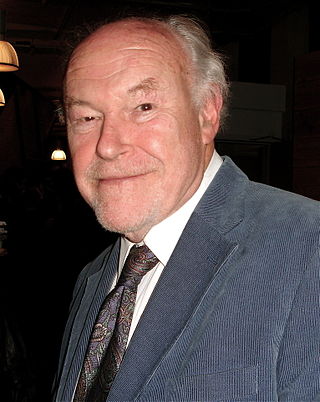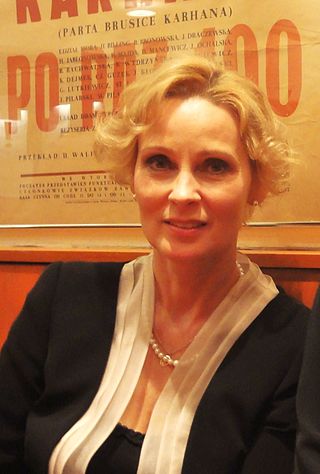Related Research Articles

Timothy Lancaster West, CBE is an English retired actor and presenter. He has appeared frequently on stage and television, including stints in both Coronation Street and EastEnders, and Not Going Out, as the original Geoffrey Adams. He is married to the actress Prunella Scales; from 2014 to 2019, they travelled together on UK and overseas canals in the Channel 4 series Great Canal Journeys.

The Royal Exchange is a grade II listed building in Manchester, England. It is located in the city centre on the land bounded by St Ann's Square, Exchange Street, Market Street, Cross Street and Old Bank Street. The complex includes the Royal Exchange Theatre and the Royal Exchange Shopping Centre.
Cheryl Campbell is an English actress of stage, film and television. She starred opposite Bob Hoskins in the 1978 BBC drama Pennies From Heaven, before going on to win the 1980 BAFTA TV Award for Best Actress for Testament of Youth and Malice Aforethought, and the 1982 Olivier Award for Best Actress in a Revival for A Doll's House. Her film appearances include Chariots of Fire (1981), Greystoke: The Legend of Tarzan, Lord of the Apes (1984) and The Shooting Party (1985).

Theatr Clwyd is a regional arts centre and producing theatre 1 mile (1.6 km) from Mold, Flintshire, in North East Wales. It opened as Theatr Clwyd in 1976, but was known between 1998 and 2015 as Clwyd Theatr Cymru, before reverting to its original name.

Terence David Hands, was a multi-award English theatre director. He founded the Liverpool Everyman Theatre and ran the Royal Shakespeare Company for thirteen years during one of the company's most successful periods; he spent 25 years in all with the RSC. He also saved Clwyd Theatr Cymru from closure and turned it into the most successful theatre in Wales in his seventeen years as Artistic Director. He received several Olivier, Tony and Molière awards and nominations for directing and lighting.

Claire Louise Price is an English actress. Her stage credits are extensive, her film and television credits include The Whistle-Blower (2001), Midsomer Murders episode "Tainted Fruit" (2001), Agatha Christie's Poirot episode "The Hollow" (2004), Rosemary and Thyme (2004), Rebus (2006-2007), Dalziel and Pascoe (2006), The Coroner (2015), The Second Best Exotic Marigold Hotel (2015), and Home Fires (2015-2016), and The Capture (2022).
Laura Wade is an English playwright.
Hindle Wakes is a stage play by Stanley Houghton written in 1910. It was first performed in 1912.
Ewan Eynon Hooper was a Scottish actor who was a graduate from, and later an associate member of RADA.
The Ian Charleson Awards are theatrical awards that reward the best classical stage performances in Britain by actors under age 30. The awards are named in memory of the British actor Ian Charleson, and are run by the Sunday Times newspaper and the National Theatre. The awards were established in 1990 after Charleson's death, and have been awarded annually since then. Sunday Times theatre critic John Peter (1938–2020) initiated the creation of the awards, particularly in memory of Charleson's extraordinary Hamlet, which he had performed shortly before his death. Recipients receive a cash prize, as do runners-up and third-place winners.
Nicholas Gleaves is an English actor and playwright.

Artur Barciś is a Polish actor and film director. His television appearances include Krzysztof Kieślowski's anthology series Dekalog (1989), the soap opera Aby do świtu... (1992), and Kurierzy ("Couriers"). From 2006 to 2016 he played the lovably neurotic Arkadiusz Czerepach in the comedy series Ranczo.

Olga Lipińska is a Polish theatre director, screenwriter, and TV comedy producer, best known for her TV cabaret called the Kabaret Olgi Lipińskiej.

Adrianna Biedrzyńska is a Polish actress. She performed in more than thirty films since 1983. She is best known for her performance as Anka in Decalogue IV.

Inka Dowlasz is a Polish theater director, playwright, screenwriter, psychologist and teacher. Dowlasz’s theatrical performances were given in theatres in Poland and abroad. From 1972–1982 she cooperated with Jerzy Grotowski’s "Teatr Laboratorium" on “Theatre of Sources", "University of Nations Theaters“ and "Tree of People", "Initiative – Mountain".
Faithful Ruslan, subtitled The Story of a Guard Dog, is a 1975 novel by Soviet dissident writer Georgi Vladimov. It is the story of a guard dog from a Gulag labor camp, told from the point of view of the dog itself.

Maria Gładkowska is a Polish film, stage, and television actress. She gained critical acclaim in the 1980s that culminated in her Zbigniew Cybulski Award (1988). Gładkowska portrayed Daisy, Princess of Pless, her breakthrough performance in Magnat (1987), which was included in the list of 100 Best Polish Films of all time.

Nina Király (1940-2018) was a Mari Jászai award-winning theater historian, dramaturg, an expert on Polish and Eastern-European theater, who lived and worked in Budapest, Hungary. From 1993 to 1999 she was the Director of The Hungarian Theatre Museum and Institute and later became the advisor on international theaters and festivals for the Hungarian National Theater and the co-creator of the International MITEM festival. During her years as the Director of the Hungarian Theater Institute she published many theater books that were previously not translated or available for the Hungarian public, introducing the works of such international luminaries as Jan Kott, Anatoly Vasiliev, Eugenio Barba, Tadeusz Kantor. She spoke 4 languages.

Joanna Hofman is a Polish actress and diplomat; ambassador to Finland (2007–2011) and Sweden (2020–2024).
Krystyna Meissner was a Polish theatre director. She founded two festivals and her awards include the Goethe Medal. She was recognised for popularising German plays and for introducing theatrical work from Eastern Europe to Western Europe.
References
- 1 2 3 4 5 6 Wardle, Irving (3 September 1994). "SHOW PEOPLE / A winner against the odds: Helena Kaut-Howson". Independent. Retrieved 8 March 2022.
- 1 2 3 4 5 Schafer, Elizabeth (2000). Ms-Directing Shakespeare: Women Direct Shakespeare. Palgrave Macmillan. ISBN 9780312227463 . Retrieved 8 March 2022.
- 1 2 3 4 5 6 7 8 9 Kaut-Howson, Helena (1995). "Flowers Among the Ruins - Identity and the Theatre". Views of Theatre in Ireland 1995 (PDF). The Arts Council.
- ↑ "OPOWIEŚĆ ZE ŚMIETNIKA HISTORII". Tydzień Polski. 16 July 2016. Retrieved 9 March 2022.
- ↑ "TEATRALNY KRZYK POLSKOŚCI… "ŹRÓDŁO" W REŻYSERII HELENY KAUT-HOWSON". Tydzień Polski. 25 October 2018. Retrieved 9 March 2022.
- ↑ Goodman, Lizbeth; de Gay, Jane (31 January 2002). The Routledge Reader in Gender and Performance. ISBN 9781134707607 . Retrieved 8 March 2022.
- ↑ Pascal, Julia (2005). Women in Theatre 2#3. Routledge. ISBN 9781135305352.
As we go to press it is revealed that, despite her success at Clywd, the Board is not renewing her contract
- ↑ Qureshi, Yakub (26 September 2009). "Top director 'fired' by theatre". Manchester Evening News. Retrieved 9 March 2022.
- 1 2 Totev, Borimir (27 August 2017). ""Faithful Ruslan" Flying After an Ideal: Interview with Helena Kaut-Howson". Theatre Times. Retrieved 8 March 2022.
- ↑ Brennan, Claire (17 September 2017). "Faithful Ruslan: The Story of a Guard Dog review – a haunting experience" . Retrieved 8 March 2022.
- 1 2 Parker, Patricia (2004). "Barbers and Barbary: Early Modern Cultural Semantics". In Masten, Jeffrey; Wall, Wendy (eds.). Renaissance Drama 33. ISBN 9780810121997 . Retrieved 8 March 2022.
- ↑ Ferris, Lesley (2009). "Lear's Daughters and Sons: Twisting the Canonical Landscape". In Friedman, Sharon (ed.). Feminist Theatrical Revisions of Classic Works: Critical Essays. ISBN 9780786452392 . Retrieved 8 March 2022.
- ↑ Senelick, Laurence (2000). The Changing Room: Sex, Drag and Theatre. Psychology Press. ISBN 9780415159869 . Retrieved 8 March 2022.
- ↑ Aston, Elaine (2005). Feminist Theatre Practice: A Handbook. Routledge. ISBN 9781134771516 . Retrieved 8 March 2022.
- ↑ Fox, Christie (2009). Breaking Forms: The Shift to Performance in Late Twentieth-Century Irish Drama. Cambridge Scholars Publishing. ISBN 9781443807739 . Retrieved 8 March 2022.